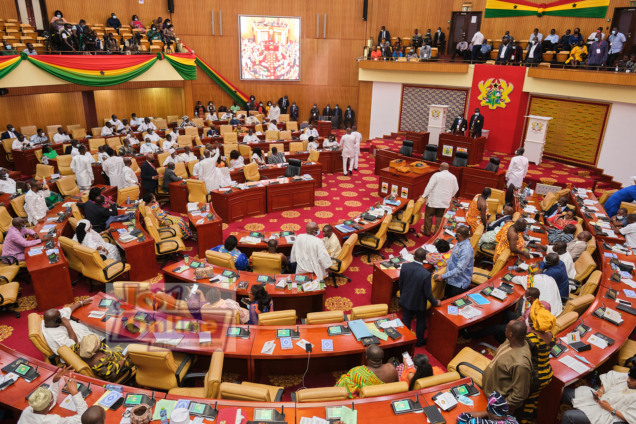
Audio By Carbonatix
Some civil society groups are urging government to re-introduce the Tax Exemptions Bill to Parliament for approval.
The bill when approved by parliament is expected to harmonise the tax exemption and incentives regime in the country and help make it more efficient.
Tax exemptions are tax waivers given to local and foreign companies to encourage increased investment and more foreign direct investment in the economy. But there are concerns tax exemptions are depriving the nation of expected taxes for development.
It is estimated that Ghana lost $2.4 billion in 2011 alone as a result of tax exemptions. The figure grew to $2.5 billion in 2013 representing 5.2% of gross domestic product (GDP).
In 2019, Finance Minister Ken Ofori Atta laid the Tax Exemption Bill 2019 before the 7th parliament for approval. But the 7th parliament never worked on it until its life span expired.
Now that the work of the 8th parliament has begun, it is expected that approval processes would have to start from scratch. A new Finance Minister would have to lay the bill before parliament again for approval to begin.
“We need to push so that the executive brings it back for the new parliament to sit on… so that the new government finds reason to bring it back to the house,” Gilbert Boyefio of Parliamentary Network Africa (PN Africa) noted.
Bernard Anaba of the Tax Justice Coalition explained tax exemptions are meant to lessen tax burden on individuals and companies to ensure sustained investment in the country and to boost economic activity. But it has negative implications as well.
“It results in loss of potential government revenues… There are positives but there are down sides to it… They also create opportunities for abuse and irregularities in the system.
"If some businesses are getting more expensive than others, it could create problem… Powerful people take advantage of the exemptions too,” he observed.
Mr. Anaba says under the current regime, there is virtually no harmonization of the tax exemption processes.
“Every ministry is getting exemptions. It has come to a stage where these incentives are given at the ministerial level. And we are losing track of what we are giving at which level and who is following up on this and making sure that what we are giving out is what we are supposed to give and we are not giving out too much,” he observes.
“The Finance Minister who is supposed to champion this gets lost in its multiplicity. So, the objective of the bill is to regularise the current exemption regime on taxes and consolidating existing regimes on tax and provide for the regulation of exemptions. It is to rationalise the exemption regime. The Finance Minister should be able to account for the incentives…” the tax expert explained.
“Parliament must consider and pass the bill as soon as possible to help shore up the country’s tax revenue,” he concluded.
When he delivered the mid-year budget review statement to parliament in 2019, the Finance Minister assured the bill will help sanitize the tax exemption regime in the country. He lamented the nation is losing too much money from tax exemptions.
He complained in the last 8 years, tax exemptions grew from 391.9 million cedis to ¢4.662 billion.
“The figures do not include exemptions from the payment of corporate and individual income taxes, concessions on tax rates, petroleum tax reliefs, customs tax exemptions enjoyed by diplomatic missions and waiver of processing charges at the ports. These exemptions are growing at the expense of tax revenue,” he noted.
“For every one Ghana Cedi of tax collected, the corresponding amount given away as exemptions have increased from six pesewas to twelve point five pesewas between 2010 and 2018. Further, exemptions may distort fair competition among businesses in the same industry where private projects are granted exemptions to improve their profitability or viability, which are not available to other players of the same industry.
“The current challenges of the exemptions regime are sustained by the existence of pre-determined tax exemptions in various legislation for future projects whose financials cannot be known today.
"The situation is not helped by an entrenched policy mindset on the part of both government entities and private suppliers that, by default, businesses that supply goods, services and projects to the public sector should be exempted from payments of customs and some domestic taxes,” Mr Ofori Atta said.
Latest Stories
-
Adom FM’s ‘Strictly Highlife’ lights up La Palm with rhythm and nostalgia in unforgettable experience
2 hours -
Ghana is rising again – Mahama declares
6 hours -
Firefighters subdue blaze at Accra’s Tudu, officials warn of busy fire season ahead
6 hours -
Luv FM’s Family Party In The Park ends in grand style at Rattray park
6 hours -
Mahama targets digital schools, universal healthcare, and food self-sufficiency in 2026
6 hours -
Ghana’s global image boosted by our world-acclaimed reset agenda – Mahama
7 hours -
Full text: Mahama’s New Year message to the nation
7 hours -
The foundation is laid; now we accelerate and expand in 2026 – Mahama
7 hours -
There is no NPP, CPP nor NDC Ghana, only one Ghana – Mahama
7 hours -
Eduwatch praises education financing gains but warns delays, teacher gaps could derail reforms
7 hours -
Kusaal Wikimedians take local language online in 14-day digital campaign
8 hours -
Stop interfering in each other’s roles – Bole-Bamboi MP appeals to traditional rulers for peace
8 hours -
Playback: President Mahama addresses the nation in New Year message
9 hours -
Industrial and Commercial Workers’ Union call for strong work ethics, economic participation in 2026 new year message
11 hours -
Crossover Joy: Churches in Ghana welcome 2026 with fire and faith
11 hours

